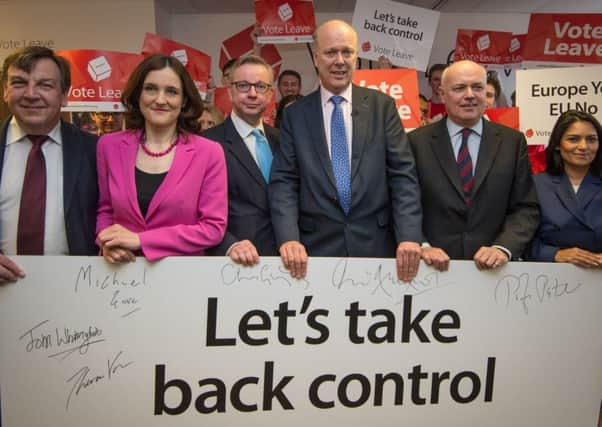Ewan Crawford: EU referendum has comparisons with indyref


The great American novelist Harper Lee wrote in To Kill a Mockingbird: “You never really know a man until you stand in his shoes and walk around in them.”
In politics the tendency is not so much to try on your opponents shoes but to stand on them as hard as you can.
Advertisement
Hide AdAdvertisement
Hide AdEmpathy tends not to play a huge part in what often amounts to political combat where the other person’s views are to be rubbished, dismissed and generally torn apart.
Indeed in a healthy democracy it’s reasonable to say competing views should be subject to the toughest scrutiny.
Working as a Scottish Government special adviser during the independence referendum, I certainly pored over the No campaign’s arguments to knock them down as hard as possible.
In turn the incoming fire from the other side at times seemed relentless.
The natural reaction to all this from campaigns is to become more and more entrenched. It means opposing views are given shorter and shorter shrift.
This has all come to my mind while watching the truly awful nature of the EU referendum debate so far.
Like many I feel totally alienated from what at times seems like an obsessive internal Tory dispute with which the rest of us are suddenly being forced to deal.
I am utterly bemused when I hear Conservative Outers banging on about how great a country Britain is and how we need to be unshackled from Europe and the dead hand of Brussels.
Advertisement
Hide AdAdvertisement
Hide AdIn 1963, explaining why he didn’t want the UK in the European Community, the French president, Charles de Gaulle, said rather insultingly: “England,” (by which I assume he meant Britain) “is, in effect insular, maritime, linked through its trade, markets and food supply to very diverse and often very distant countries.”
At times it seems as if some on the Leave side look back fondly on such a description as a British golden age.
I find myself wanting it all to go away until 24 June when hopefully the In campaign will have won and this can all be put to bed.
This big point here is that there is very little attempt to reach out to those not similarly obsessed.
It feels as if voters (or more precisely those who aren’t members of the Conservative Party or Ukip) are mere by-standers.
Looking back to the independence campaign, I like to think that contest generated very different feelings. With a few weeks to go it seemed as if the most of the population was genuinely and enthusiastically engaged.
In sharp contrast to the Leave campaign, those of us involved in making the case for a Yes vote were determined to look forward optimistically (too optimistically in the view of our opponents) rather than backwards.
But of course, I realise that for some, perhaps many, people who were opposed to independence the overwhelming sense was similar to mine in regard to the EU referendum: a profound hope that it would all soon be over.
Advertisement
Hide AdAdvertisement
Hide AdAt the time, caught up in frantic campaigning, I could barely acknowledge such a view, let alone try to understand it.
Yet thinking about No voters, the current referendum has, I think, allowed me for the first time to some extent “stand in their shoes”.
This is particularly important for the ongoing constitutional debate in Scotland.
The self-indulgent decision of Labour to destroy itself means we are going to be faced with a Conservative government at Westminster for at least another nine years.
That means in total Scotland will be governed for 20 years or more by a party it comprehensively rejects at each and every election. It is surely inconceivable that such an eventuality will not lead to further questioning of the Union and demands for a second referendum.
But secondly, there has been a tendency to re-run the first referendum and among participants play a game of “I told you so” rather than think ahead to the next.
I am as guilty of this as anyone. Whether it is job losses at HMRC, pension uncertainty or indeed the prospect of being dragged out of the EU, the temptation is to compare what was said before the referendum about what would happen with a No vote and what has actually come to pass.
Along similar lines Better Together campaigners highlight oil revenue forecasts in the White Paper and the subsequent collapse in prices.
Advertisement
Hide AdAdvertisement
Hide AdOn this last point, however, I noticed an Oil & Gas UK factsheet last week confirming there are indeed up to 20 billion barrels of oil and gas still to be recovered (see how difficult this game is to resist).
But this gets to the heart of how those of us who believe in independence need to think about things and construct arguments for the future.
A second referendum is unlikely to take place for at least several years. This means there is the opportunity to carry out what the Scottish Government in 2007 called a “National Conversation”.
This conversation should focus particularly on the key economic concerns that a majority of people clearly felt had not been fully addressed in 2014.
During that campaign one of the things I am proudest of was the way we brought to the fore Scotland’s huge strengths and potential in food and drink, manufacturing exports, energy, the creative sector and a range of other industries.
The key challenge is to ensure many more people feel they can play an active part in fulfilling that potential and benefiting from it.
The current EU campaign is an object lesson in how to exclude people. Let’s never go there.